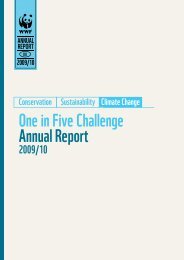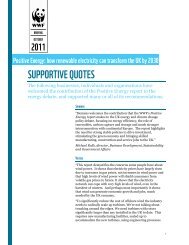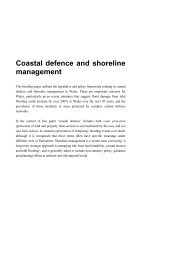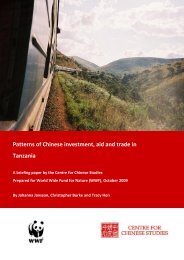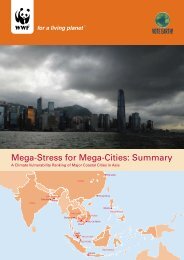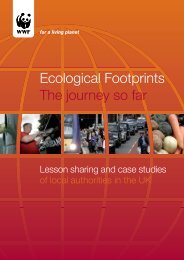Positive Energy: how renewable electricity can transform ... - WWF UK
Positive Energy: how renewable electricity can transform ... - WWF UK
Positive Energy: how renewable electricity can transform ... - WWF UK
Create successful ePaper yourself
Turn your PDF publications into a flip-book with our unique Google optimized e-Paper software.
Renewable energy: economics and opportunities<br />
Attracting capital investment<br />
Decarbonising the <strong>UK</strong> power sector and retaining system security will need substantial<br />
capital investment. It is worth noting that substantial capital investment in the <strong>UK</strong> power<br />
sector would be required in any event, given that over a quarter of the <strong>UK</strong>’s generation<br />
capacity is to retire over the coming decade.<br />
Whether the <strong>UK</strong> adopts the ambitious targets for <strong>renewable</strong>s set out in GL GH’s scenarios<br />
or lower levels such as 40% by 2030 recommended in the CCC’s review, the level of<br />
investment needed is signifi<strong>can</strong>tly above the balance sheet capacities of the <strong>UK</strong>’s major<br />
utilities – in particular those of the ‘big six’ energy companies.<br />
Attracting the necessary capital investment in clean energy technologies (especially<br />
energy efficiency and <strong>renewable</strong>s) within the necessary timescales is a vital challenge<br />
to meet. Barriers and market failures preventing investment in low carbon generation<br />
include the perception of emerging <strong>renewable</strong>s as high risk, given that many technologies<br />
are at early stages of development and lack of confidence around future policy support.<br />
The importance of clear policy support signals<br />
investment<br />
certainty is key<br />
to increasing<br />
the capital<br />
flowing into<br />
<strong>renewable</strong> energy<br />
infrastructure<br />
A recent policy brief led by the Grantham Research Institute/LSE 51 argued that the <strong>UK</strong><br />
economy has a stock of financial reserves available to support investment in the low<br />
carbon power sector and that “the issue is a lack of confidence to invest rather<br />
than a lack of liquidity”. The report referred in particular to the £110bn surplus<br />
generated by the <strong>UK</strong>’s private sector in 2010. Only £2bn of this was invested in clean<br />
energy (both private and public). The Grantham Research Institute/LSE brief also<br />
concluded that “credible long-term policy signals could leverage finance and unlock<br />
private investment in <strong>renewable</strong> energy, smart networks and communities, energy<br />
efficiency and low carbon vehicles on a great scale 52 ”. Improving investment certainty in<br />
the clean energy sector is key to increasing the amount of capital flowing into <strong>renewable</strong><br />
energy infrastructure.<br />
Policy recommendation: The reformed <strong>electricity</strong> market must include well designed,<br />
long-term financial support mechanisms for <strong>renewable</strong> technologies<br />
<strong>WWF</strong>-<strong>UK</strong> 2011 <strong>Positive</strong> <strong>Energy</strong> page 47<br />
<strong>WWF</strong>-<strong>UK</strong> 2011 <strong>Positive</strong> <strong>Energy</strong> page 47



